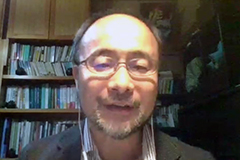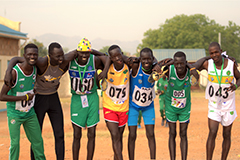Deputy Director Makino Gives a Presentation on Human Security 2.0 at a Symposium Hosted by UNDP
2021.07.05
Between June 8-11, 2021, an online symposium titled “A New Generation of Human Security” was held by the Human Development Report Office of the United Nations Development Programme (UNDP). Makino Koji, the deputy director of the JICA Ogata Sadako Research Institute for Peace and Development (JICA Ogata Research Institute), participated as a panelist.
UNDP in partnership with the government of Japan are planning to publish a special report that revisits human security in this new era. The symposium was held as part of the process to develop this special report and discussions took place at the following four sessions: Session 1 “Structural changes to human security threats – The Anthropocene with lurking pandemics and the Digital Age”; Session 2 “Threats to human security: violent conflicts and crime”; Session 3 “Human insecurity as a threat to human development”; and Session 4 “The way forward: new aspirations and new responses during challenging times.”
Session 2, in which Makino participated, started with remarks from Laura Chinchilla, co-chair of the High-Level Advisory Panel for the Special Report on Human Security (and the former President of Costa Rica), followed by keynote speeches from Michael Barnett, professor at George Washington University, and Mary Kaldor, professor emerita at the London School of Economics.
The session then moved on to a panel discussion by five panelists including Makino. The following panelists gave presentations as follows: Toby Ord, senior research fellow in Philosophy at Oxford University, on the risks that threat human security; Joana Monteiro, head of the Center for Applied Research to Public Safety, Getulio Vargas Foundation, on violence by armed groups in Brazil; Andreas Feldmann, associate professor at the University of Illinois at Chicago, on how criminal organizations have ruling power in Latin America; and Joaquin Salido Marcos, program management officer, and Manuella Nehme, consultant on conflict and human development, both of the United Nations Regional Commission for Western Asia (ESCWA), on human security and human development in Arab states through the activities of ESCWA.
Makino first outlined JICA's commitment to human security. He said that the core of JICA's mission is human security, a concept that its former president, the late Ogata Sadako advocated passionately, and the current president Kitaoka Shinichi further pushed the implementation of the concept. Makino explained that in addition to “freedom from fear” and “freedom from want,” which are two major components of human security, JICA is putting forth focus on the “freedom to live in dignity” as well, and is revisiting human security in today’s global context (Human Security 2.0). He also pointed out that conflicts posing threat to human security are tending to become more protracted and internationalized. While in the days of Ogata the challenge was smooth transition from humanitarian aid to development assistance, today, we are required to approach the two perspectives simultaneously, he said. As an example, Makino introduced JICA’s program conducted in collaboration with the office of the United Nations High Commissioner for Refugees (UNHCR) that assists both South Sudanese refugees and Ugandan host communities. Furthermore, he mentioned that the global community must work together and utilize digital tools to stop the spread of extremism and further social polarization, as violent extremism can spread across borders through social media.

Deputy Director Makino Koji participated as a panelist
Moreover, Makino brought up the impacts of COVID-19, saying that the pandemic has put human security of vulnerable people at greater risk. He said, although there were fewer conflicts temporarily, now situations are tending to worsen again, due to dissatisfaction among societies. In addition, he pointed out that the freedom of individuals is suppressed as a trade-off for safety under measures to control the pandemic in many countries, creating human rights and dignity-related issues. Finally, Makino shared two new approaches for peacebuilding. The first was enhanced collaboration with the private sector such as issuing human security bonds, providing financial assistance to companies helping refugees gain economic independence, and assisting startups by refugees. The second was further utilization of digital transformation, as with cases in which JICA is using social media, big data and satellite images from conflict areas in the Philippines and Uganda.
The panel discussion was followed by a Q&A session and a wide range of topics were discussed, from the outlook of human security to its relevance with current political situations. Makino was asked how to specifically realize an approach that focuses on dignity, and after making it clear that no established method exists yet, he said that a combination of top-down protection and bottom-up empowerment is important. More specifically, he suggested that legislation development, governance, media, addressing low birthrates and aging populations, or vulnerable people may be the areas where the approach focusing on dignity can be effectively applied. He shared a case in South Sudan where support for a national sports festival helped reconciliation between diverse races that were opposing each other and enhanced awareness of dignity, which not only means to respect oneself but also others.

Makino shared a case in South Sudan where support for a national sports festival helped reconciliation between diverse races (Photo: JICA)
During the Q&A session, a comment to appraise JICA’s Human Security 2.0 was made from the audience, along with many questions and comments for Makino.

事業事前評価表(地球規模課題対応国際科学技術協力(SATREPS)).国際協力機構 地球環境部 . 防災第一チーム. 1.案件名.国 名: フィリピン共和国.

事業事前評価表(地球規模課題対応国際科学技術協力(SATREPS)).国際協力機構 地球環境部 . 防災第一チーム. 1.案件名.国 名: フィリピン共和国.

事業事前評価表(地球規模課題対応国際科学技術協力(SATREPS)).国際協力機構 地球環境部 . 防災第一チーム. 1.案件名.国 名: フィリピン共和国.

事業事前評価表(地球規模課題対応国際科学技術協力(SATREPS)).国際協力機構 地球環境部 . 防災第一チーム. 1.案件名.国 名: フィリピン共和国.

事業事前評価表(地球規模課題対応国際科学技術協力(SATREPS)).国際協力機構 地球環境部 . 防災第一チーム. 1.案件名.国 名: フィリピン共和国.
scroll